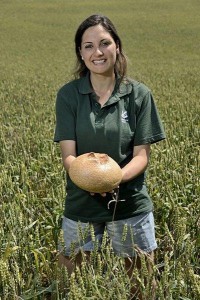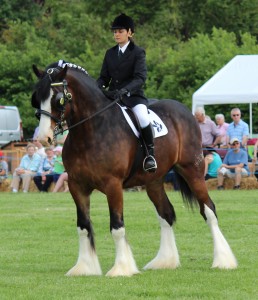 Having achieved a 1st class honours degree from one of the leading Agricultural Universities in the country, been awarded the Top Student award and having won the prestigious Grand Idea Entrepreneurs’ competition; Abigail Erian BSc, now manages Wimpole Hall’s livestock and arable farm. It’s safe to say that being a woman has not held her back in her pursuit of a career in farming and she believes that the profession has a lot to offer her fellow females.
Having achieved a 1st class honours degree from one of the leading Agricultural Universities in the country, been awarded the Top Student award and having won the prestigious Grand Idea Entrepreneurs’ competition; Abigail Erian BSc, now manages Wimpole Hall’s livestock and arable farm. It’s safe to say that being a woman has not held her back in her pursuit of a career in farming and she believes that the profession has a lot to offer her fellow females.
When did you know that you wanted to make farming your career?
With a family history in farming and having grown up with a love of the countryside, perhaps it’s no surprise I’ve ended up where I have. However, it was my love of horses that initially took me to the Royal Agricultural University (RAU) as they offered a great International Agricultural and Equine Business Management course. I suppose at this point I didn’t really know what a career in farming might look like for a woman and wasn’t something I’d seriously considered.
However, the course really sparked my interest in the practical and theoretical aspects of agricultural business and it became clear to me that it offered multiple opportunities. Looking back at my childhood, I suppose I did spend an unusual amount of time ‘playing farm’ with my sister…….. Maybe it wasn’t so much a conscious decision and more the fact that a love of farming is just part of who I am and my mother’s family history.
Can you give us a bit of an overview of the types of things you’ve been involved in?
Hmmm…where to begin?! I’ve done everything from scraping out pig pens to discussing genetics of cattle breeding with her HRH Princess Anne. Being involved with both arable and livestock businesses, I’ve had a really varied exposure to the industry which has been invaluable. A lot of farming work is obviously seasonal – so in the summer you might find me on a Combine or carting corn; whereas during the winter I’m more likely to be looking after the livestock and horses – and of course Easter brings with it lambing and calving duties.
How did you come to be talking to Princess Anne?!
Don’t get me wrong – liaising with royalty isn’t a regular part of my job. I was invited to the opening of a new department at RAC where Princess Anne was the official guest. I was first in line to meet HRH and we somehow got chatting about Suffolk punches and then the genetics of cattle. She was really nice and we had such an interesting conversation. She’s a great inspiration for women who love the countryside.
Is it unusual to see women in farming roles?
Let’s just say that I’m not a stranger to being the only women on the farm, or to the surprised looks of the lads when a woman rocks up for the first day of harvest! Not to mention the less than lady like tea-break banter… But it never bothers me. In fact, I quite enjoy overthrowing any previously held assumptions and proving that women are just as capable (if not more so) as men. During one harvest where I worked with a team of men, I was told that I’d have to be twice as good as the boys to survive. I not only survived but got invited back several times! In my current job, the farm team is definitely still-male dominated, but we do have three women on our team, and I think things are generally progressing in this respect.
Do you think it’s tougher for women to have a career in farming than men?
Certainly not from the point of capability, but I do think women still have to battle against the prejudiced attitude, which is a legacy of a time when farming was considered a man’s job. This can mean that women are held to even higher standards than men in the same roles to prove their worth. However, I’ve yet to be faced with a true gender-specific dilemma – the biggest barrier seems to be our own self-doubt. Once this is overcome, it tends to open endless doors.
What attributes do you think women bring to farming?
In my experience, women tend to be highly motivated, make quick, rational decisions and be good at getting the job done – all excellent attributes for a career in any business. In the past it was often just expected that the man of the house would take over the family farm, but this isn’t the case anymore and young people of both sexes are making their own informed decisions about entering the profession. The sector is rapidly diversifying too, so we’re seeing more roles opening up which are just as suitable for men and women. It’s becoming less about manual labour and more about having good business acumen and an understanding of the industry – something which women can certainly master just as well as men.
Do you think attitudes towards women in farming have changed?
I think attitudes in certain environments are changing and I think it’s becoming more accepted to be a female livestock farmer. However I think the battle is still to be won with arable farming or machinery-related careers. People still make comments and jokes whenever I rock up on a tractor and automatically assume I won’t be as efficient at the task. As I mentioned, I secretly quite enjoy the challenge and proving a point (I’m awesome on a tractor!) The only way this attitude will change fully is if more determined and hard-working women fancy helping me prove the point too!
Do you think there’s more that could be done to encourage women to consider farming as a profession?
There are a number of initiatives which are run by various organisations that provide support, guidance and motivation for aspirational young farmers. These are not exclusive to women but, of the two genders, I think having that support is often more important for females as often it’s about lack of confidence. For example, I never thought I would win the Grand Idea competition for entrepreneurs but doing so in 2012 really boosted my confidence and I began to think of my capabilities in a whole new light.
Similarly, I was recently selected for Tesco’s Future Farmers Foundation programme which takes on around 15 young men and women each year who have plans for their own farming enterprise, giving them a wide range of support and training. There’s an even spread of men and women in my group this year and so far it’s been an invaluable experience.
Do people assume that you spend your life in wellies because you are a farmer?
Yeah, sometimes I think people assume my bed is made out of straw and that I live in overalls – often they don’t even recognise me when we meet at a posh social event! But being a farmer doesn’t mean you can’t be feminine – I love to wear a pair of killer heels just as much as the next woman when the occasion arises. And I’d say it’s even more satisfying as you can make a true Cinderella transformation (although I haven’t quite mastered the pumpkin to carriage conversion yet…!)
What would your best piece of advice be to young women contemplating a career in farming?
Firstly, I would say if you love rural life and you’re a hard-worker, then go for it! And don’t think of yourself as a female farmer – but just a farmer. So far I’ve not come across anything where women are at a disadvantage. It’s definitely worth investigating the vast number of possibilities on offer and to have confidence in your abilities. The support is out there if you look for it and is well worth taking advantage of.
To find out more about Abi, visit her Facebook page (Abi Erian) where she often updates her blog or email her at abigailerian@hotmail.co.uk. You can also read more about her involvement in the Future Farmers Foundation here.
